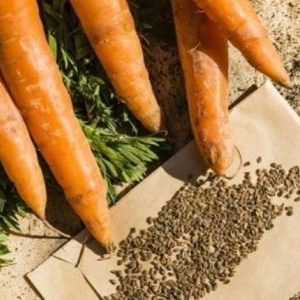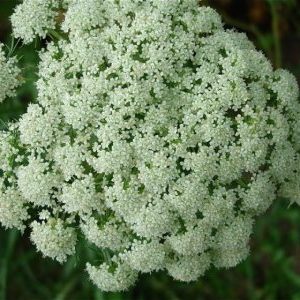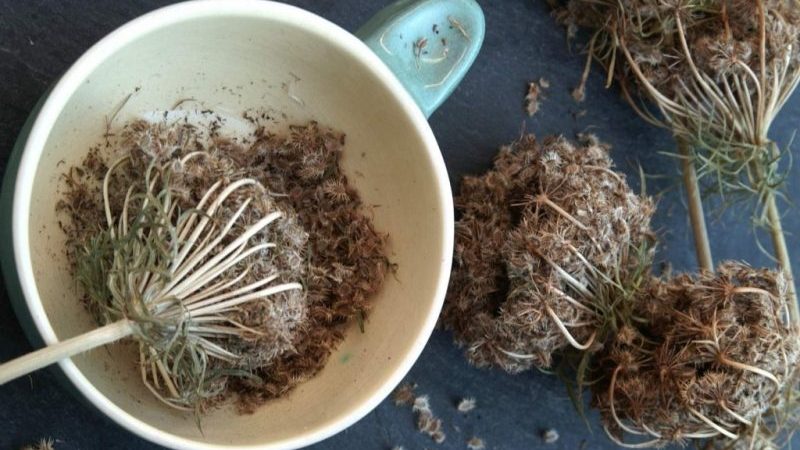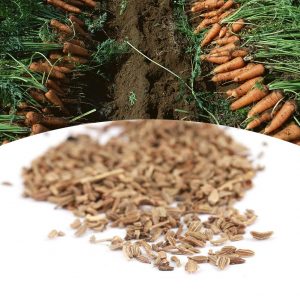When to harvest carrot seeds and how to do it right
Many gardeners prefer to harvest carrot seeds on their own, rather than buying material in stores. The reasons are different: the desire to get an environmentally friendly crop, to grow a certain grade or mistrust of manufacturers. The purchased seed does not always guarantee the desired result. Therefore, many summer residents prefer to collect seeds on their own.
Getting seeds for sowing at home is a simple process, but it requires some preparation. How to do this correctly, we will tell you in the article.
The content of the article
How to grow carrots for seeds at home
Carrots are a biennial plant. In the first year, root crops are suitable for preparing various dishes and preserving, and you can get seeds for further growing crops only in the second year.
Choice

For these purposes, varietal, not hybrid carrots are used. The crop should not be resistant to premature flowering.
Choose large root crops. Pay attention to the color characteristic of the variety and the correct shape. Root crops must be clean, without mechanical damage.
The carrots are kept in boxes of sand and examined regularly throughout the storage period.
Planting a garden
At home, the garden is grown in containers. 1-2 days before planting, roots are disinfected in a weak solution of potassium permanganate. They are planted in containers and placed close to each other, since the plant must be pollinated. Root crops are planted in the soil to their full length, leaving a tail of greenery on the surface. Carrots are taken strictly of the same variety.
Important! The soil in the container should contain sand.
Usually carrots are planted in open ground at the end of April. But it's better to wait until the frost ends. The cold soil of seed carrots is not suitable.
Wells are prepared on the garden bed, the depth of which should correspond to the size of the root crops. Root crops are planted vertically, so that the head is not above the soil level. The distance between the carrots in a row should be at least 40 cm, and the distance between the rows should be at least 70 cm. It is better that the planting site is sunny.
Attention! Do not plant umbrella crops and wild carrots next to seed carrots.
Care
At the time of planting, it is recommended to add some ash or compost to the hole, then the soil will be filled with nutrients. While the tops are growing, the carrots are fed with fertilizers containing nitrogen.
During budding of carrots, potash fertilizers are suitable.
While the seed carrot is growing, the soil is regularly mulched, weeded and watered, without overmoistening or overdrying the soil.
Important! The main pest of the root crop is the carrot fly. They escape from it by adding a soap solution to the soil, which kills the larvae.
How carrots bloom, how and where do seeds grow
In the middle of summer, the first inflorescences of carrots appear. Carrots bloom with white umbrellas, shaped like dill umbrellas. Carrot seeds ripen in these flower stalks. In August, the umbrellas ripen and are almost ready for harvest.
In the photo there are carrot flowers.

When to collect carrot seeds
Carrot seeds are harvested at the optimum stage of maturity. In immature, as in overripe, the ability to germinate is reduced. Overripe can crumble, then there will be no way to collect them.
Collection time
The picking time depends on the weather, climatic conditions and the type of carrot. Basically, the material is collected in July - early August. To determine the term, the condition of the plant is regularly checked.
Signs that seeds are ready to be harvested
The first sign of ripening is a change in the color of the inflorescences. They begin to darken, acquire a dark beige, sometimes brown color.
When the inflorescence is completely dry, it is ready to harvest.
How to assemble correctly

At first glance, there are a lot of seeds in the inflorescences. But not all of them are suitable for planting.
Large inflorescences are selected, small branches are removed, the stem and main shoots are left. If the summer is wet, the inflorescences are cut off and placed in a dry room to ripen. There must be good ventilation in the room.
The final readiness of the umbrellas can be checked by rubbing them with your hands - the seeds will easily crumble.
It is better to shake off the seeds in prepared containers. These can be plastic cups or small containers. A fabric pouch will also work.
How to select unusable seeds
The highest quality seeds for planting are located at the edges of the inflorescences. It is recommended to pour them into a separate container.
Carrot seeds are strewn with small villi, so different rubbish sticks to them. When poured into a container, it will be on the surface. It is collected and thrown away.
To test the suitability of the seeds, they are soaked for 2 hours in water at room temperature. Low-quality ones float to the surface, and high-quality ones settle to the bottom. Then high-quality seeds are filtered and dried.
Where and how to store carrot seeds
Within 2-3 years, the seed material of carrots does not lose its germinating power if it is stored correctly.
The dried seeds are stored in linen bags or small cardboard boxes in a cool, dark place. Plastic containers and plastic bags are not suitable for storage, as they do not allow air to pass through. It is important that moisture does not get into the container. Avoid direct sunlight.
During the storage period, the condition of the material is periodically checked, if spoiled seeds appear, they are thrown away.
At high humidity, the seeds are re-dried at room temperature.
Tips from experienced summer residents
Gardeners' tips will help beginners achieve the desired result:
- Clean carrot seeds before planting from essential oils and tannins - they prevent germination. For cleaning, dry seeds in gauze bags are spilled with hot water (not higher than 50 ° C), and then kept in cold water for 10-15 minutes.
- Give preference to organic fertilizers - manure, humus, chicken droppings. If you use manure as fertilizer, it is applied to carrot beds 1-2 years before sowing. Freshly removed manure spoils the taste and shape of root crops.
Summer residents with experience in seed production recommend choosing varieties that give good seed:
- early varieties - Touchon, Dutch, Amsterdam, Lady;
- medium varieties - Nantes, Carotel, Chantane Royal;
- late varieties - Red giant, Vita longa, Bayadera.
Read also:
A high-yielding variety of Romos carrots with strong immunity.
A sweet variety of Shantane Royal carrots of bright orange color.
Conclusion
Getting and harvesting your own quality carrot seeds is easy, following the basic rules. The basis for an excellent result is the selection of a suitable variety of carrots, plant care and timely collection of seeds, as well as compliance with the storage conditions for seed.